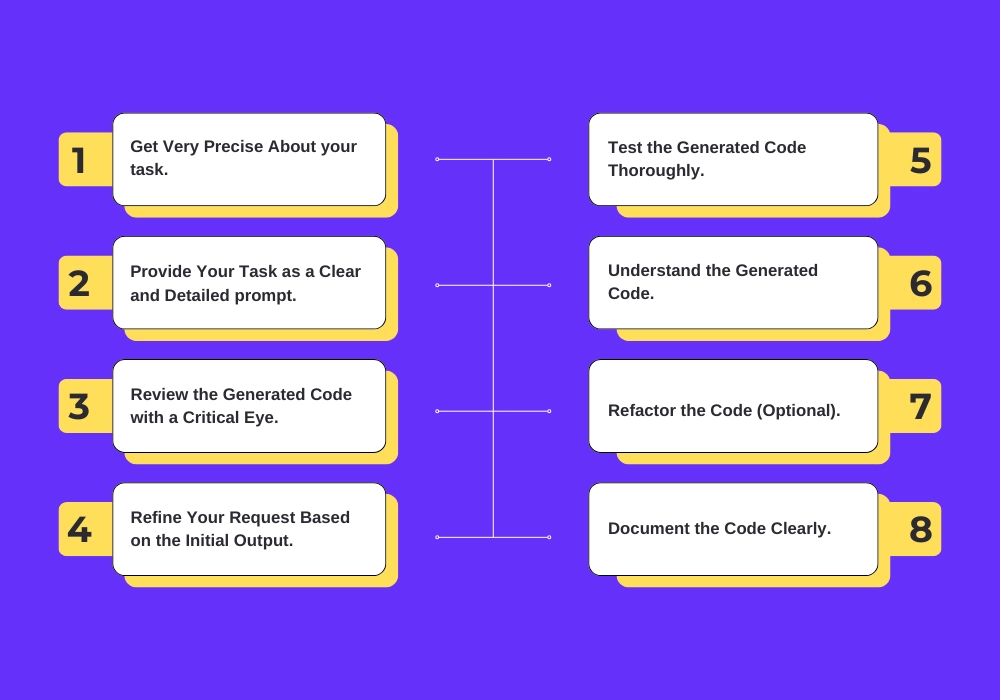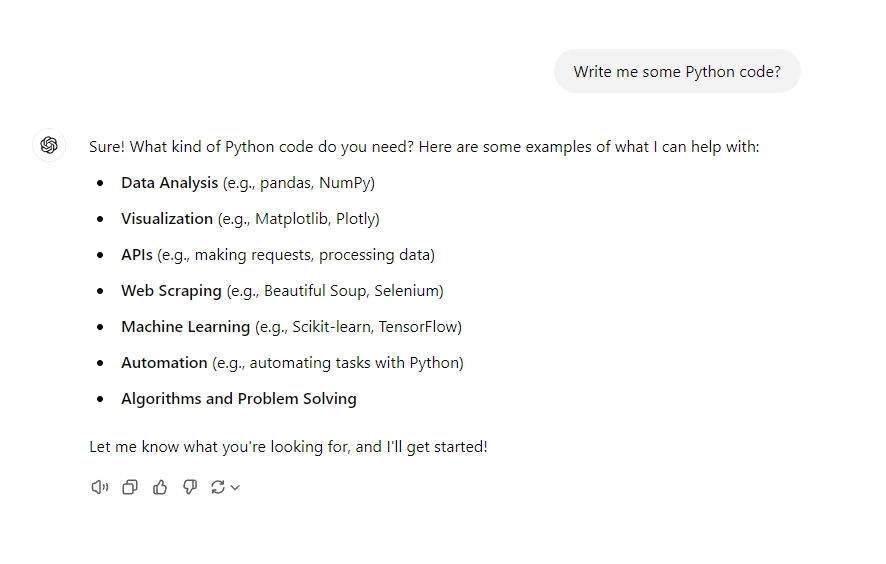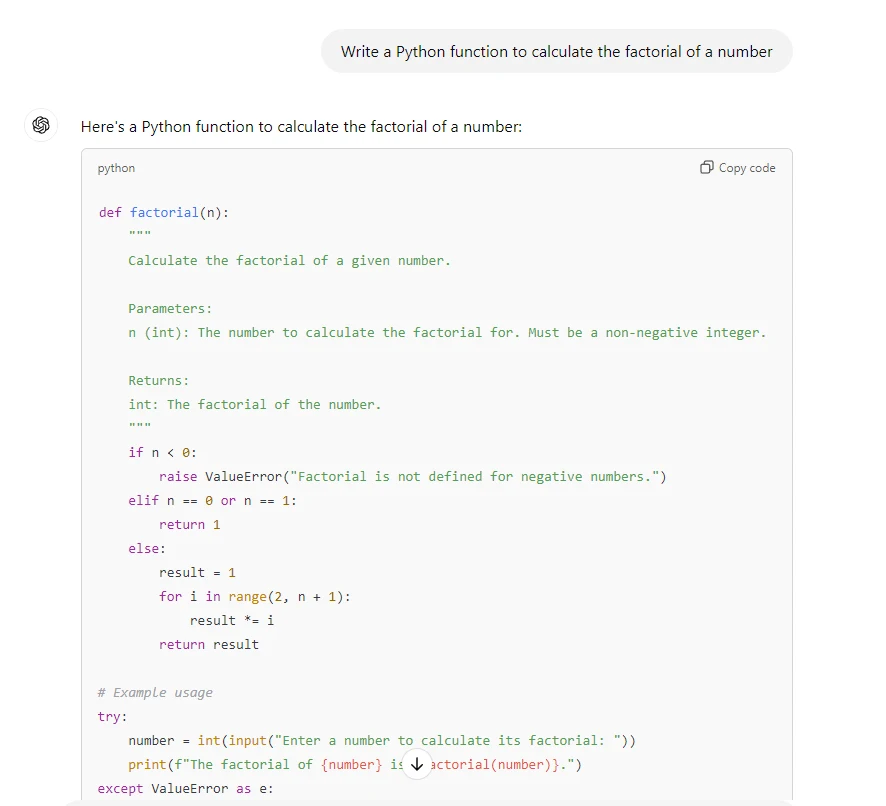Sometimes it feels difficult to code, especially if you’re stuck or new.
ChatGPT acts as a smart coding assistant in Writing code, fixing bugs, explaining concepts as well as brainstorming ideas.
The best part is that it works with various programming languages like Python, JavaScript and plenty more!
In this blog, I’ll guide you step by step and show examples of How To Use ChatGPT To Write Code effectively.
Why ChatGPT for Coding?
ChatGPT is a great tool for coding because it makes programming simple and fast.
Whether you are just starting or have lots of experience, it can help with any task.
The best part?
Whether you are developing in Python, JavaScript, or C++ : ChatGPT supports it.
It works with many programming languages like Python, JavaScript, and many more, so you can use it for different projects.
You can ask it to write code, fix errors, or explain things you don’t understand.
It’s quick and saves you time by giving clear answers instead of searching for solutions online. With ChatGPT, coding becomes easier and more fun!
It’s like a coding assistant, you can ask any time.
It can output code, debug errors, and can explain tricky stuff. This saves you time, helps you think of ideas, and can actually be entertaining.
What is ChatGPT?
OpenAI’s ChatGPT is an AI tool- Smart
It can produce human-like text and has been trained on a large dataset, including programming knowledge.And since it does a lot of the hard work, this makes it a great helper for coding tasks.
You give it a clear prompt and it writes down the code, answers your questions, or explains to you how things work.
It is a super smart buddy to help you out with your coding needs.
Read more: How to Use ChatGPT 4 for free in 2024? [No Cost, No catch]
How to Use ChatGPT to Write Code?
Writing Code using the power of ChatGPT
In this article, I’ll outline the process of using ChatGPT for code tasks in its simplest form.
By following these steps, you’ll get the best results and use them effectively
Step 1: Get Very Precise About your task
Before asking ChatGPT, are you clear about what you want? Do you want to solve a problem, write a function or debug an error?
The more precise you are with your request, the better ChatGPT will understand it.
Example: If you say, "Write me some Python code,"

Instead say, "Write a Python function to calculate the factorial of a number."

Step 2: Provide Your Task as a Clear and Detailed prompt
The best way to use ChatGPT is to write clear instructions.
Make sure to provide as many details as you can (i.e. language, if for a goal or requirement etc.).
Example: If you want help with HTML:
"Create a simple HTML page with a title 'My Web Page' and a heading that says 'Welcome to My Website.' Also, include a paragraph with some sample text." The key is to be specific about the task, the goal, and any conditions or details!
Step 3: Review the Generated Code with a Critical Eye
Instead of simply copying and pasting the code that ChatGPT gives you, don’t simply copy and paste it blindly.
Review it carefully. Make sure the code actually does what you asked for and without errors or what could be improved.
Tip: As long as something seems wrong with the code, you can ask ChatGPT why. It may reveal what is going down.
Step 4: Refine Your Request Based on the Initial Output
Sometimes, the first output might not be perfect. If that happens, refine your prompt. Be more specific or ask ChatGPT to fix or improve the code.
Example: “The function works, but can you add comments to explain each step?” or “The code doesn’t handle negative numbers. Can you fix that?”
Step 5: Test the Generated Code Thoroughly
Always test the code in your development environment. Run it with different inputs to see if it behaves as expected. This step is important because ChatGPT-generated code might work in some cases but fail in others.
Tip: Create edge cases to test, like inputs that might cause errors or unexpected behavior.
Step 6: Understand the Generated Code
Don’t just use the code—understand it. Take time to read through the logic and learn how it works. This will help you improve your coding skills and modify the code later if needed.
Step 7: Refactor the Code (Optional)
If you have time, refactor the code to make it cleaner or more efficient. ChatGPT often provides functional code, but it might not always follow best practices.
Look for ways to simplify or optimize the logic.
Step 8: Document the Code Clearly
Good documentation makes code easier to read and maintain. If ChatGPT doesn’t add comments, ask it to.
Add details about what the code does, how it works, and any limitations or special cases.
Example:
from typing import List
def calculate_average(numbers: List[float]) -> float:
"""
This function takes a list of numbers and returns their average.
If the list is empty, it returns 0.
"""
if not numbers:
return 0.0
return sum(numbers) / len(numbers)Read more: How to Use ChatGPT API in Python? Beginners Can Do!
Final Thoughts
like any tool, it’s only useful in a responsible way. You always need to review, test, and understand the code that it generates.
Using ChatGPT has not only saved me time but I have learned new ways of approaching the coding problem.
So, give it a try! This means whether you are a beginner or have been programming for many years, having ChatGPT in your corner will dramatically simplify your code journey.
So, give it a try! Having ChatGPT in your toolkit will make coding simpler and faster.
Plus, for those wondering "Who owns ChatGPT stock", it’s developed by OpenAI, a private company supported by investors like Microsoft. If you’re curious about "How to Use ChatGPT 4 for free", some platforms or trials might provide access—always explore options to make the most of this amazing tool.
Happy coding!
